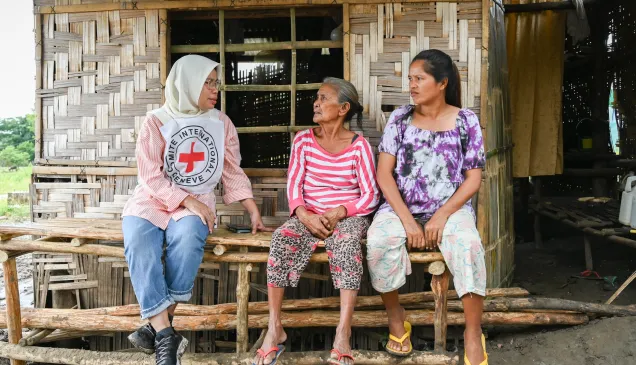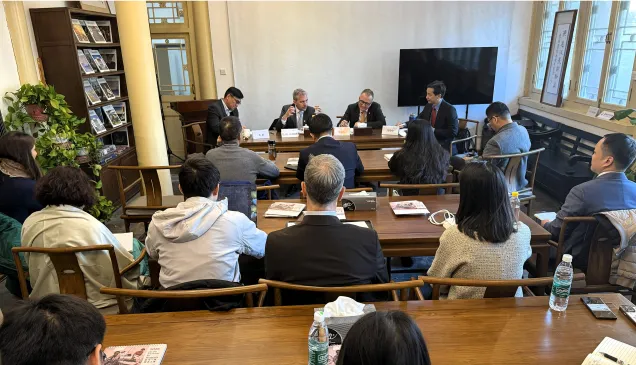ICRC operational response to COVID-19 in the Asia-Pacific
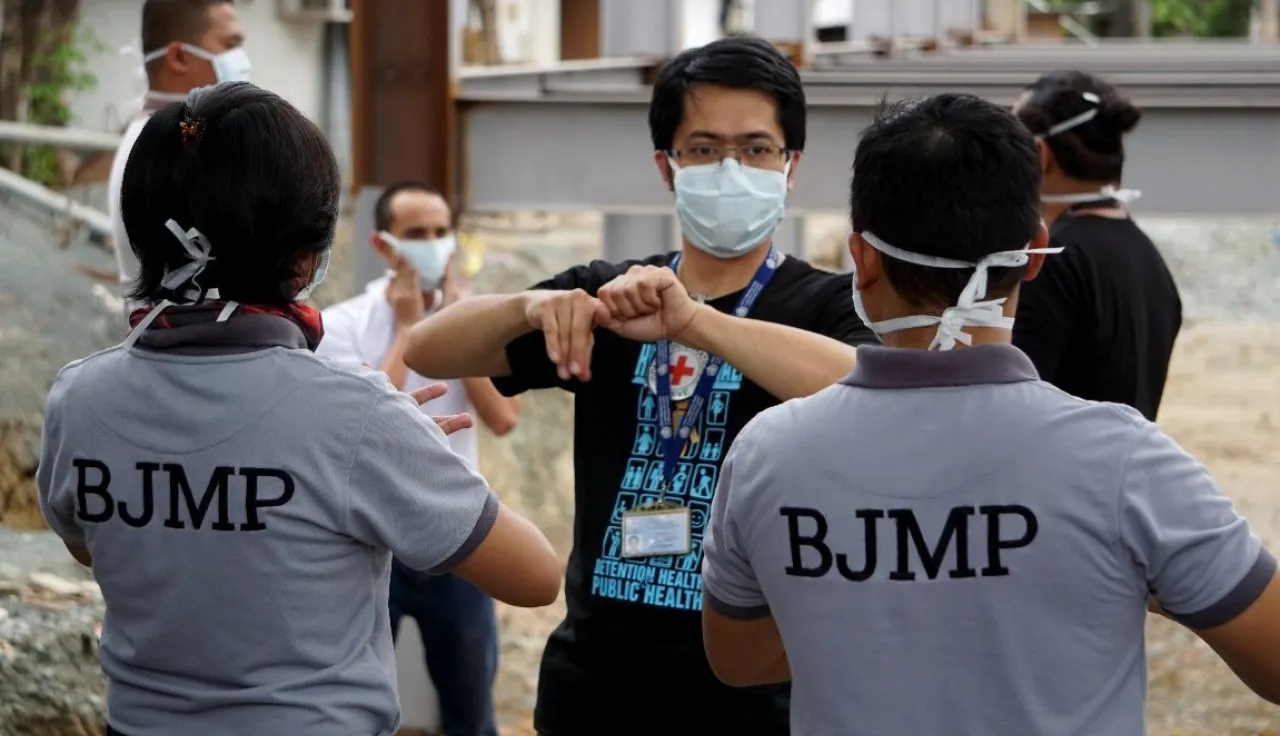
Unprecedented stress on the most advanced health-care systems. Extreme strain on major economies and financial markets. A global shutdown such as the world has never seen before.
This is today's reality as COVID-19 continues to spread unabated in over 160 countries across the world. With the Asia-Pacific region being home to 60 per cent of the world's population – i.e. some 4.3 billion people – an uncontrolled outbreak could be devastating.
With a well-coordinated and well-resourced response mechanism involving national and international actors, the danger can be averted.
To contain the spread of COVID-19, early efforts have included strict measures such as restriction on movement and lockdowns. Some countries face an already compromised public health-care system, overcrowded detention facilities, densely populated camps of displaced populations and informal settlements, adding layers of vulnerability for populations already facing immense challenges.
Download Asia-Pacific bulletin on COVID-19 response
For an overview of ICRC response to COVID-19 in the Asia-Pacific region in 2020, please click here:
DOWNLOAD OVERVIEW OF ASIA-PACIFIC RESPONSE TO COVID-19
For ICRC response to COVID-19 in ASEAN Member States, please click here:
DOWNLOAD ASEAN REPORT ON COVID-19
Our response to COVID-19
Like elsewhere, in the Asia-Pacific region also the International Committee of the Red Cross (ICRC) has joined the massive efforts being carried out by governments, international community and humanitarian organizations to fight the spread of this novel coronavirus. We have massively adjusted, and where relevant, launched new initiatives to support national authorities, health-care facilities, places of detention and local Red Cross and Red Crescent Societies to respond to the pandemic.
Our operational response to COVID-19 in the region focuses on four main areas:
- Supporting health-care facilities
- Infection-control in detention facilities
- Humanitarian forensics (management of the dead)
- Support to Red Cross and Red Crescent National Societies
Below, you will find the country-wise description of what is being done across the Asia-Pacific region.
In Afghanistan, we are part of the COVID-19 taskforce led by Ministry of Public Health, along with the World Health Organization, the Afghan Red Crescent, the International Federation of the Red Cross and Red Crescent Societies (IFRC) and others. Our operational response to COVID-19 focuses on prevention and infection control in places of detention and supporting the health facilities.
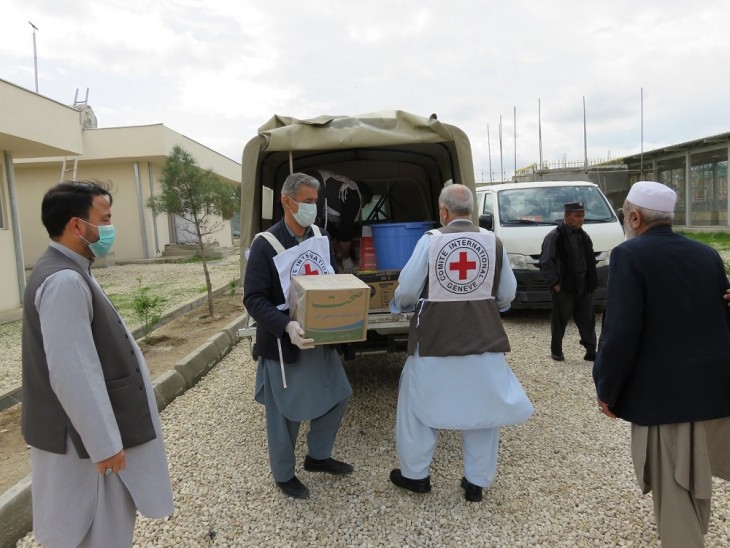
The ICRC's operational response in the Asia-Pacific includes donation of medical, hygiene and protective equipment in Afghanistan.
We are working with the Afghan prison authorities and Ministry of Public Health in four prisons that house thousands of detainees. These prisons are Pul-i-Charki Prison, Herat Provincial Prison, Sarpoza Provincial Prison in Kandahar and the Parwan Detention Facility, Bagram. Our work in these places of detention includes donation of medical, hygiene and personal protective equipment, installation of handwashing points, medical screening, conducting infection-control training sessions, generating awareness, carrying out initial assessment and helping with case management to respond effectively to the crisis.
In Kandahar, we are supporting the Ministry of Public Health in Mirwais Regional Hospital, where our work includes taking care of infection-control contingency stock in the pharmacy as well as replenishing the items so that patient care is not compromised. Washbasins have been installed at entry gates to the compound and contingency stocks of cleaning materials like soap and chlorine have also been given. We have helped hire nurses and trained them to screen patients at public entrances. A similar exercise has been carried out to screen people in border areas.
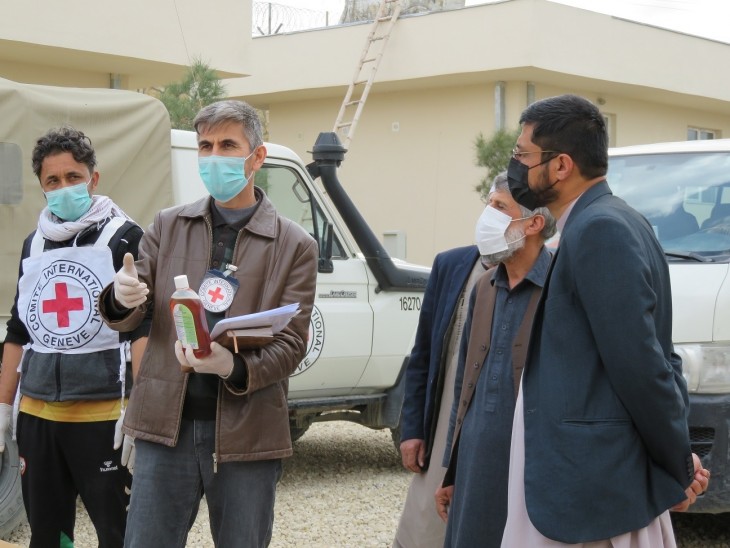
As a part of our operational response in the Asia-Pacific, contingency stocks of cleaning material like soap and chlorine have been distributed.
Improving the preparedness of the isolation ward, we have donated thermometers, phones and other equipment to the hospital. Public information tools like brochures and banners have been handed over to the provincial health directorate for distribution in primary health-care clinics, airports and border screening areas.
To ensure access to safe drinking water, we will distribute spare parts and continue to train community water committee members in carrying out hand-pump repairs and maintenance.
In Myanmar, we have adapted our humanitarian response across the country to the new realities of COVID-19.
The ICRC is aware of the increasing risks that COVID-19 represents in Myanmar, so we are preparing our teams and adapting our programmes accordingly. It is our priority to continue our mission to protect and assist the communities affected by armed conflict and violence whilst safeguarding the health of all communities where we work, as well as of our own staff.
While we are maintaining essential work in Kachin, Rakhine and Shan states for people affected by various armed conflicts and other situations of violence, we are also maximizing efforts to control the spread of COVID-19, together with the Myanmar Red Cross Society, to support the Ministry of Health and Sports.
Continuing to help the communities affected by the 2017 crisis and its aftermath in Rakhine, we are also distributing food rations, supporting access to health care and ensuring basic water and sanitation systems for communities displaced by the ongoing armed conflict. We are also working on emergency evacuations and health-care assistance to weapon-wounded civilians.
Our commitment to helping people displaced by conflict in Rakhine has never changed.
But the way we help has — for the health and safety of the community and our staff against #COVID19.#coronavirus pic.twitter.com/3KL97hVElJ— ICRC Asia-Pacific (@ICRC_AsiaPac) April 7, 2020
At the national level, we are supporting the prison authorities in prevention and control of infection as well as to help organize safe return home of those recently liberated following the presidential pardon that involved nearly 25,000 detainees.
In Kachin, we are supporting state health authorities by renovating existing facilities being prepared for quarantine. In Shan, we are working with the Myanmar Red Cross Society to provide hospitals with essential items such as soap, while also spreading life-preserving messages among the communities.
Throughout Myanmar, we have adapted our working protocols and put new safety measures in place to ensure there is no risk of exposure to the virus for all communities we work with, in line with the highest standards of duty of care and accountability to affected populations.
We are also engaging with all relevant segments of the society, including non-state armed groups, ethnic health organizations, prominent religious figures and local media to convey COVID-19 prevention messages and landmine awareness information to the communities, including those in government and non-government-controlled areas.
A simple but effective hygiene practice to keep clean:#WashYourHands As #COVID19 cases are rising in #Myanmar, communities that lack healthcare and information access are our priorities.#coronavirus pic.twitter.com/LlfwUyebMu
— ICRC Asia-Pacific (@ICRC_AsiaPac) March 31, 2020
In Bangladesh, we are working to enhance the preparedness of 68 prisons across the country in the face of a possible outbreak. Work is underway to implement infection-control and prevention measures in these detention facilities. We continue to support more than 3,000 displaced people from Rakhine who are living in a camp and depend entirely on humanitarian aid for their survival. As part of the aid, we have distributed one-month food ration and hygiene material there.
Detention facilities are particularly vulnerable when it comes to prevent & contain infectious diseases.
We are working with the Prison Directorate & Ministry of Home Affairs to enhance preparedness of 68 prisons across #Bangladesh in the face of a possible #COVID19 outbreak.pic.twitter.com/8cfmPoLmxT— ICRC Bangladesh (@ICRC_bd) April 6, 2020
Similarly, we are supporting the health-care structures in Cox's Bazar, Teknaf, Ukhiya, Ramu, Nayapara and Tumbru and reinforcing our assistance to the emergency department of Sadar Hospital, the district's main health facility in Cox's Bazar. As part of the measures, we have handed over body bags for dignified management of the dead.
Preventive messages on COVID-19 are being relayed during all activities for the displaced populations in Cox's Bazar and host families, as well as for people living in Chittagong Hill Tracts. We are also stepping up our support to the Bangladesh Red Crescent Society, whose thousands of volunteers are on the front line of this crisis.
In the Philippines, we are working with the authorities and the Philippine Red Cross to protect the health of detainees and staff, given the current levels of congestion in detention facilities in the country. We recently set up four isolation units, provided training on infection-control practices and handed over personal protective and basic medical equipment, apart from making provisions for electricity, water supply and sanitation. As part of our persuasion efforts, we are holding high-level dialogue and engaging with authorities for ensuring safeguards to vulnerable people, including our recommendation for immediate decongesting measures such as early release and parole.
Addressing the health needs in the conflict-affected areas of Mindanao, we restocked supplies in the medical facilities that we support, including provision of personal protective equipment for front-line responders. As part of our support, we have planned food distribution and cash transfers to help those who have been hit the hardest due to enhanced community quarantine in conflict-affected areas. In Marawi city, we took measures to ensure the supply of potable water for thousands of residents and displaced people.
To support the collective humanitarian response to COVID-19 in Pakistan, we have redirected a part of our annual budget to initiatives aimed at infection-control activities in hospitals, prevention of outbreak in places of detention, supporting the Pakistan Red Crescent Society and raising awareness on preventive measures.
In Pakistan, our partners include the Pakistan Red Crescent Society, health and physical rehabilitation facilities across the country and in Pakistan-administered Kashmir, detaining authorities and local rescue and relief organizations that have a nationwide footprint.
Additionally, along with health and hygiene support, we also disseminate critical life-saving information to the most vulnerable communities to help control the spread of COVID-19.
In Sri Lanka, we shared a response plan with the local authorities following a series of high-level meetings to understand and assess the needs, priorities, coordination mechanisms and areas in which we could add further value. We have placed the most vulnerable - mainly in detention settings - at the center of our concerns and aim to support the authorities in the prevention and control of COVID-19.
Our Sri Lanka response plan stands on three pillars:
- Support to places of detention like prisons, police stations and immigration centres: Strengthening hygiene, disinfection, waste management, infection prevention and control measures.
- Support to public health structures like hospitals, morgues and quarantine centres: Technical and advisory guidance, material and equipment support for disinfection, waste management, disinfection of dead-body holding areas and transporting vehicles, management of COVID-19 deaths and mortuary waste management.
- Support to the Sri Lanka Red Cross Society: This includes carrying out preventive and hygiene-promotion activities, material distribution and mental and psychosocial support work together.
Our work in Thailand includes supporting the Thai Red Cross Society to reach out to isolated and migrant communities by providing technical training in risk communication, information and education materials, as well as translating these materials into local languages and dialects.
In detention facilities, we have shared with all authorities concerned and stakeholders several guidance materials on health, water and engineering relating to COVID-19 prevention and response in detention settings.
This includes the promotion of several Virtual Reality tools to help the authorities.
An important focus has been to provide the detaining authorities with hygiene material to prevent and mitigate the spread of the virus while detainees in these facilities use communication tools to maintain contact with their families since the family visits have been suspended during the pandemic.
We are supporting Thai hospitals along the Myanmar border to provide COVID-19 testing and treatment for Myanmar migrants who would otherwise face prohibitively high costs. We are also equipping community health organizations to spread prevention and awareness education among their communities, in addition to supporting health centres to be properly equipped in infection prevention and control measures.
In Cambodia, we are mobilizing the Cambodian Red Cross for hygiene promotion at community level as well as training the trainers to increase awareness about prevention of the disease. To support the country's penitentiary system and physical rehabilitation sector, our teams are providing them with technical advice about screening measures, crucial medical and non-medical assistance as well as hygiene and personal protective equipment.
#ICRC supporting prisons #Cambodia; on 10 April, an ICRC team provided 230,000 USD of PPE material to the Directorate General of Prisons in Phnom Penh to protect 38,000 prisoners and 4,000 prison staff from #COVIDー19 outbreak pic.twitter.com/UtG37aBIQV
— Christoph Sutter (@CSutterICRC) April 11, 2020
In Laos, we are advising the authorities through promotion of best practices regarding the management of the dead. In coordination with the IFRC, we are also providing masks and personal protective equipment to the Lao Red Cross.
In Viet Nam, our work is focused on communications support on hygiene promotion for the National Prevention Campaign as part of the call by the Viet Nam Red Cross Society and Vietnamese authorities. We have also been procuring masks and personal protective equipment for the National Society and are involved in a dialogue with authorities on management of those who succumb to COVID-19.
As the pandemic looms, our work in Papua New Guinea is based on a multipronged approach, including stepping up operations by providing personal protective equipment, hygiene and awareness material to health facilities in the Highlands as part of the capacity-building measures.
Besides setting up a triage and a 12-bedded isolation ward at Mount Hagen Hospital, we are training and sensitizing village birth attendants on COVID-19 so they can reach out to vulnerable communities of Enga, Hela, Southern and Western Highlands.
As places of detention are especially vulnerable to an outbreak, we are working closely with authorities to provide necessary support to these facilities in Port Moresby, the Highlands and Bougainville. So far, we have distributed hygiene material, handwashing stations and sensitized detainees and prison staff on COVID-19. We are collaborating and supporting the PNG Red Cross Society in their nationwide awareness campaign.
Our regional delegation in India (New Delhi) covers Bhutan, India, Maldives and Nepal. We are working very closely with the Indian Red Cross Society, and as the first step, provided its volunteers with personal protective equipment including jackets, masks, gloves and body bags, along with logistical support in their work on the front lines in all districts of the country. Additionally, we are supporting the health department in Jammu and Kashmir and CAPF Composite Hospital at BSF Academy-Tekanpur in Gwalior, by providing them with personal protective equipment.
We have also developed #InfoAsAid tools to counter misinformation and raise awareness on preventive measures. These have been shared with government and non-government authorities, organizations and partners, particularly to address the needs of people with disabilities and forensic professionals. We have also shared our best practices and guidance documents from the fields of health in detention and forensics, especially dignified management of the dead, with institutions involved in the COVID-19 response in India, such as the WHO and UN agencies.
Staying home is necessary to slow down the spread of #COVID19, but it does not mean we have to be socially disconnected.
Let's talk to our near and dear ones, especially the elderly, and frequently check on them. #StayHome pic.twitter.com/hgFTYqa8rO— ICRC New Delhi (@ICRC_nd) April 14, 2020
In Bhutan, about 1,000 Bhutan Red Cross Society volunteers from 20 district branches are working to spread awareness on social distancing and hygiene promotion in the community.
Meanwhile, in Maldives, a detailed set of recommendations on measures to mitigate the effects of COVID-19 on the prison system and communities have been provided to the Correctional Services (Ministry of Home Affairs). The Maldives Red Crescent has set up a psychosocial support centre for people in isolation and quarantine facilities, besides taking many other measures to spread correct information about the pandemic.
In Nepal, we have donated surgical masks to the forensics department of Patan district hospital to help them resume work. Following a joint assessment with the Nepal Red Cross, tents and tarpaulins were provided to quarantine areas of two detention centres in Kathmandu. The National Society continues to support the communities by provision of essential items and mobilizing blood donation to avoid shortages during the pandemic. They also donated 260 body bags to the security forces and a hospital. Meanwhile, we shared guidelines on management of the dead specific to COVID-19 with the Ministry of Home Affairs and other authorities.
In Indonesia, we are focusing on preventive measures in places of detention. These include distribution of hygiene and medical protection material like soaps, masks, gloves and disinfectant.
We are supporting the Indonesian Red Cross in the field of health and ambulance service through modification of the vehicles to be better equipped for COVID-19 response. Proper personal protective equipment and other financial support will be provided to the staff and volunteers for the first three months.
To help preventing the spread of #COVID19 in the prisons, we support @DITJEN_PAS with soaps, disinfectant sprayers, and thermometers. https://t.co/HSN1I8Xvkn
— ICRC Indonesia (@ICRC_id) April 7, 2020
In a bid towards dignified management of the dead, we are procuring and distributing disposable masks, gloves, overalls, appropriate body bags, etc., and conducting training and dissemination sessions via Skype to prepare the responders for their role.
In Timor-Leste, we are supporting the Timor Leste Red Cross in its response to COVID-19 with messages of awareness, donation of materials and proper training in management of the dead. In detention settings, we are assisting the National Society by conveying family news from people in quarantine facilities to their families. With regards to the detaining authorities, we have provided them with a set of institutional recommendations as well as donated personal protective equipment.
The ICRC regional delegation in Kuala Lumpur, Malaysia, has donated thermometers, masks, soaps and hand sanitizers to all places of detention across Malaysia in support of the Prisons and Immigration departments' COVID-19 response efforts.
Soaps are crucial in the fight against #COVID19.
To support @penjaramalaysia’s efforts in preventing an infection in prison, our teams have distributed 7,000 soaps to the Sg Buloh prison!
Every little bit goes a long way. Let’s all do our part. #StayAtHome #flattenthecurve pic.twitter.com/rROoFrWFoM— ICRC Malaysia (@ICRC_my) March 26, 2020
We have provided technical advice on health care in detention and continue to engage in a bilateral dialogue with authorities on other areas of support. Posters on how to maintain hygiene have been distributed to all the places of detention.
From the regional delegation in Kuala Lumpur, we are also supporting the Malaysian Red Crescent Society, Brunei Darussalam Red Crescent Society and Singapore Red Cross through the mobilization of funds for their emergency-response activities such as food distribution for vulnerable communities, blood donation campaigns, provision of information and communication materials, and many other initiatives.
Close proximity & confinement in detention make detainees very vulnerable to #COVID19.
To help @penjaramalaysia & @imigresenmy prevent an outbreak, we've donated protective & hygiene items to detention places across Malaysia.
Kajang Women's Prison received theirs last week pic.twitter.com/dWEIEnW8kt— ICRC Malaysia (@ICRC_my) April 6, 2020
In the Pacific Island Nations, out of our regional delegation based in Suva, we have been working with the IFRC in strengthening the communications role in each of the 11 National Societies (Palau, Marshall Islands, FSM, Kiribati, Tuvalu, Tonga, Samoa, Cook Islands, Vanuatu, Solomon Islands and Fiji).
Our coordination efforts include messaging on social media (awareness and prevention), encouraging the use of mass media (radio and television) for dissemination and highlighting the work of each National Society through media organizations, locally and abroad.
Furthermore, we are in the process of purchasing hygiene material for correctional facilities in the Pacific Island Nations. In response to the pandemic, since most correctional services have suspended family visits, hundreds of detainees have been able to touch base with their families, friends and legal counsellors with the cell phones distributed by the ICRC in these facilities.
In Australia, we continue to engage with government and key organizations and people on matters related to policy and humanitarian laws, albeit with a strong focus on the pandemic.
The impact of a #COVID19 outbreak in places of detention would be devastating.
Overcrowding, poor hygiene and lack of ventilation pose an extra challenge to preventing infections.
"...once inside a prison, infections are very difficult to contain." https://t.co/3StZRdDu0V— ICRC Australia (@ICRC_au) March 17, 2020
We are also in constant touch with our Movement partners at the Australian Red Cross and supporting their work domestically where we can, especially in terms of raising awareness about the need to preserve space for humanitarian action in this crisis. We are also talking to our colleagues around the world who are on the frontlines of this fight, finding ways to share their stories of hard work, hope and resilience with Australians.
Since the beginning of the outbreak in China, we have remained in close contact with the Red Cross Society of China, expressing our solidarity and support with the staff and volunteers responding to the crisis. In March 2020, we made a modest financial contribution to the National Society for its domestic response to COVID-19.
In Japan, we highly value the political and financial support of the nationto our humanitarian activities globally. During the pandemic, we continue working closely with our government partners and the Japanese Red Cross for coordination and information sharing. Similarly, our colleagues continue bringing the updates from our global operational response to the Japanese audience.
多くの人の命を救う献血は、“不要不急の外出”にはあたりません
ご協力いただける方は、社会的距離を保つためにも、電話やネットでご予約の上、最寄りの献血ルームなどにお出かけください。#InfoAsAid #コロナウイルス https://t.co/xZNQw6cLWh— 赤十字国際委員会 (@ICRC_jp) April 15, 2020
Our office in Seoul is in close contact with the Korean National Red Cross and has expressed our solidarity and support in responding to the situation in Republic of Korea.
In April 2020, ICRC President Peter Maurer had a telephonic conversation with the Minister of Foreign Affairs, where the latter vowed to continue supporting ICRC's global humanitarian endeavours.

